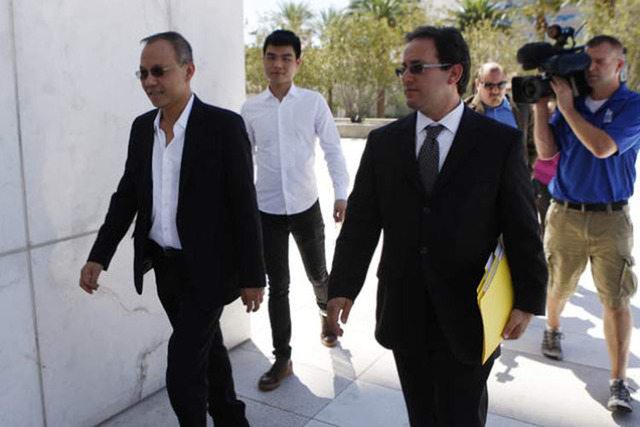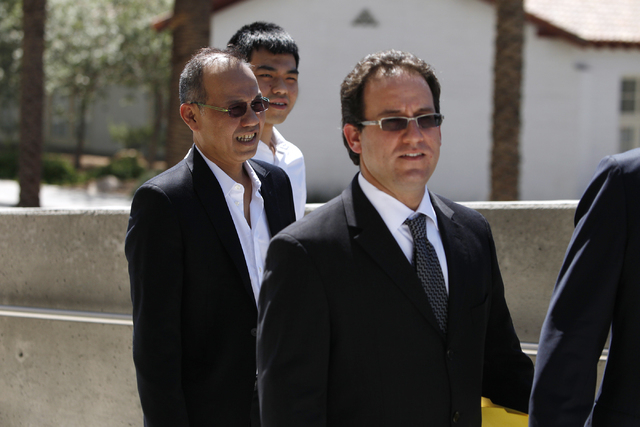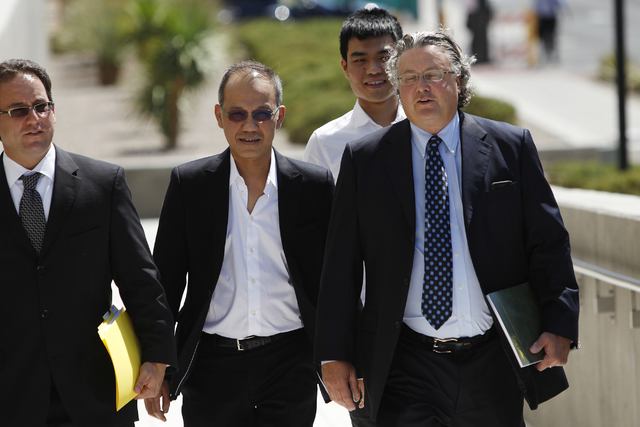Prosecutors work to salvage federal illegal gambling case
Federal prosecutors are fighting to save their high-profile illegal gambling case against a wealthy Malaysian businessman and his son.
Prosecutors filed court papers Tuesday challenging a magistrate judge’s recommendation tossing out the brunt of evidence against Paul and Darren Phua because of an error-filled FBI affidavit used to obtain a search warrant in the case.
Authorities have alleged the Phuas were part of a sports betting operation run out of Caesars Palace luxury villas that unlawfully accepted millions of dollars in wagers on the 2014 World Cup. The defendants face an April 13 trial before U.S. District Judge Andrew Gordon.
U.S. Magistrate Judge Peggy Leen this month found that “false and misleading statements” were made by FBI agents in the sworn affidavit seeking permission to search the villas in July. Leen concluded the search warrant affidavit, without the errors and false statements, was “fatally flawed” and lacked probable cause to support the search.
On Tuesday, assistant U.S. attorneys Kimberly Frayn and Phillip Smith Jr. disputed Leen’s findings, arguing that despite any misstatements, FBI agents presented plenty of evidence when applying for the search warrant to show there was probable cause to believe the Phuas were engaged in criminal activity.
The prosecutors said the errors were not intentional, reckless or of a material nature that would support a finding to suppress the fruits of the search warrant. They asked Gordon not to accept Leen’s findings and keep the case against the Phuas alive.
Prosecutors previously said in court that they would have a tough time proving the case without the evidence seized in the July 9 raid. FBI and state gaming agents seized dozens of cellphones, computers, iPads and other electronic equipment from the three high-roller villas.
Defense lawyers David Chesnoff and Thomas Goldstein, meanwhile, filed court papers Tuesday asking Gordon to overrule Leen’s finding that agents did not violate the constitutional rights of the Phuas when they set up an unprecedented ruse to enter their Caesars villa four days before the raid.
Leen did not buy the defense’s argument that agents conducted an unconstitutional, warrantless search of the villa to bolster the search warrant affidavit for the July 9 raid.
Agents cut Internet service to the Caesars villa July 5, then entered it posing as computer technicians working to fix the problem. Despite the deception, the Phuas by allowing the undercover agents inside had given their consent to the July 5 search, Leen concluded.
Chesnoff and Goldstein disagreed Tuesday.
“The government’s position in this case — and the legal rule the magistrate judge suggested this court adopt — would shock the conscience of ordinary Americans,” the lawyers told Gordon in their court papers. “It is an assault on our deepest constitutional values that cannot be taken seriously.”
Leen had chastised the agents in her decision for failing to disclose the ruse when getting authorization for the July 9 raid. She said the magistrate judge who approved the search warrant, Nancy Koppe, should have been given that information to help her determine whether agents had demonstrated probable cause for the July 9 search.
The Phuas were among eight defendants charged in the alleged betting scheme prosecutors say earned a $13 million profit. Five defendants from Malaysia and China pleaded guilty in December and each was fined and sentenced to five years of probation with the condition they stay out of the United States during that period. The case against a sixth defendant was dismissed.
Contact Jeff German at jgerman@reviewjournal.com or 702-380-8135. Follow @JGermanRJ on Twitter.
RELATED:
Agent testifies about raid on gambling operation
Caesars security discovered World Cup betting room before feds brought in, witness says
Lawyers grill FBI agent about Caesars search warrants
Three take plea deals in federal World Cup betting ring case
Federal prosecutors: World Cup betting suspect may have bribed his way to freedom in Macau
Chinese mob linked to World Cup betting ring bust in Las Vegas
Lawyers: Agents spied on suspects in World Cup betting scheme
Caesars lawyers deny privacy violation in World Cup betting sting
Malaysian man pleads not guilty in World Cup betting case
Prosecutors seek to detain World Cup betting suspects
3 key defendants in World Cup case ordered released
Malaysian businessman charged in betting scheme released
8 indicted in World Cup betting scheme
International mob-connected ring linked to illegal World Cup betting at Caesars



















